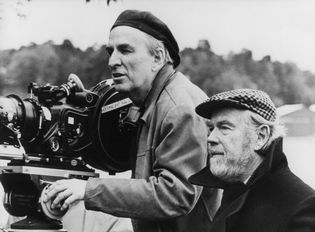News
SEARCHING FOR INGMAR BERGMAN
Media:

"Searching for Ingmar Bergman," directed by German director Margarethe von Trotta, starts on a rocky beach, the same rocky beach featured in Bergman's 1958 film "The Seventh Seal." Von Trotta herself sits on a boulder, staring out at the waves and reciting, from memory, each shot from the opening sequence of "The Seventh Seal": Max von Sydow sprawled on the shore, the horse in the water, the chessboard on a rock. Von Trotta speaks of what Bergman's work meant to her, how revelatory it was at the time. "Searching for Ingmar Bergman" isn't really a "search," ultimately. It's a pretty straightforward presentation of Bergman's career, his films, his obsessions, his themes. Von Trotta walks over very well-trod ground, interviewing the usual suspects (although it's always good to hear from them), listening to well-known stories told elsewhere. However, it's still an engaging and accessible look at one of the most important figures in cinema.
Von Trotta started out as a cinephile inspired by the French New Wave, and then threw herself into the burgeoning film industry of post-War West Germany, first as an actress (appearing in films directed by Rainer Werner Fassbinder and Volker Schlöndorff, two of the leading figures of the New Germany Cinema) and then as a filmmaker herself. She co-directed 1975's "The Lost Honor Of Katharina Blum" with Schlöndorff, before moving on to a solo directorial career ("The Second Awakening Of Christa Klages," "Marianne & Juliane", "Rosa Luxembourg"). In 1994, Ingmar Bergman was asked by the Göteborg Film Festival to list his 11 all-time favorite films, and he included Von Trotta's "Marianne & Juliane" (alongside "Rashomon", "Sunset Boulevard," "Passion of Joan of Arc" and "Andrei Rublev"). Von Trotta was the only woman on Bergman's list.
READ MORE: https://www.rogerebert.com/reviews/searching-for-ingmar-bergman-2018
If you want to contribute with your opinion, you can do it through our Facebook link (at the top of the page)



















